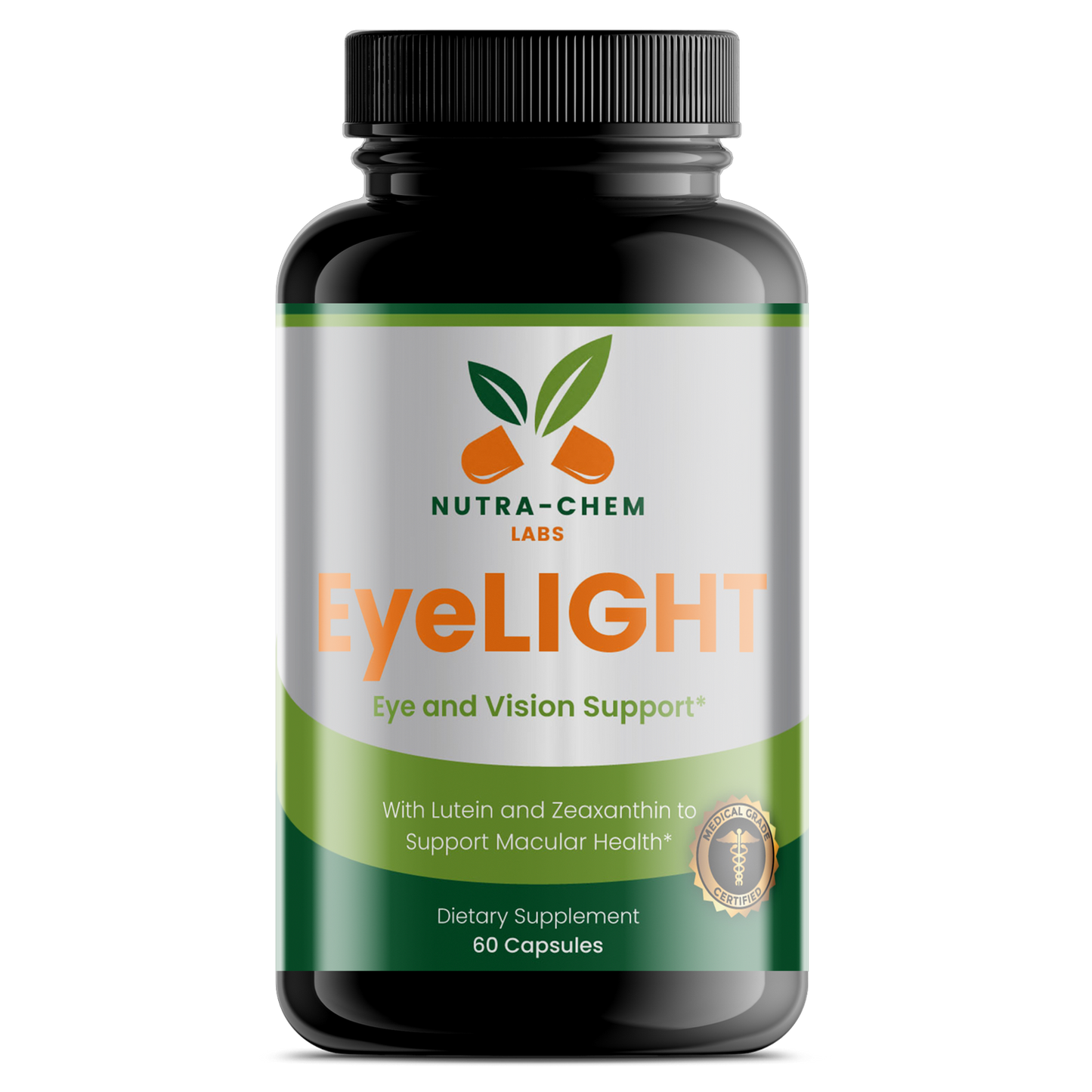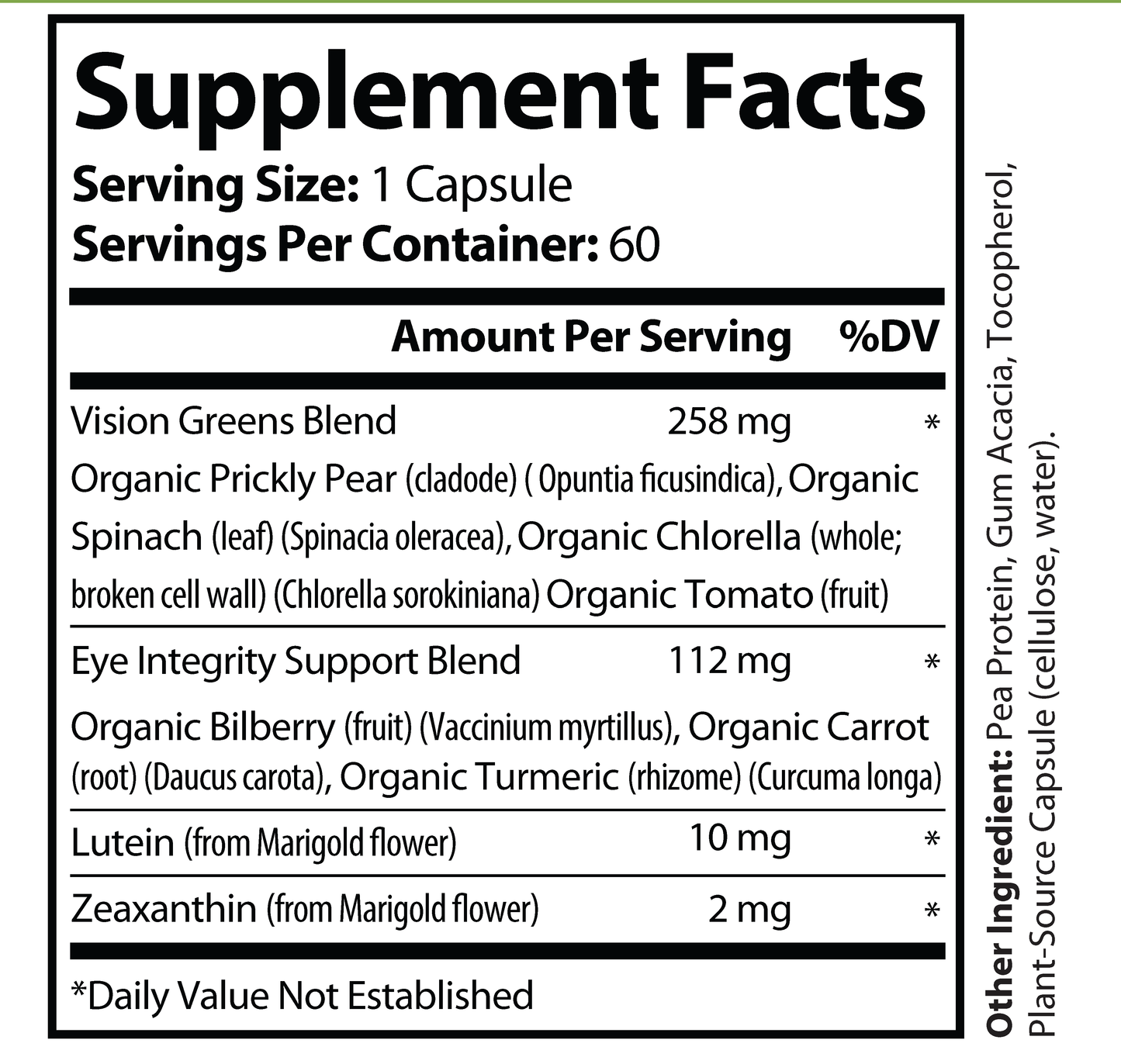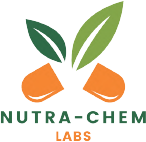- Description
- Key Ingredients & Benefits
- Usage & Directions
- Quality Standards
- Warnings
- Sources
EyeLIGHT is a high-quality eye health supplement meticulously crafted using science-backed ingredients to support vision, retinal health, immune function, and antioxidant protection. This powerful formula incorporates natural lutein and zeaxanthin from marigold flowers, renowned for enhancing visual performance and promoting macular health.
Lutein & Zeaxanthin (10 mg & 2 mg per capsule, respectively)
-Essential carotenoids that enhance visual health, protect against blue light, reduce the risk of age-related macular degeneration, and improve retinal macular pigment.
Eye Integrity Support Blend™
Bilberry Extract : Supports vision, cardiovascular health, blood sugar balance, and antioxidant defenses.
Organic Prickly Pear : Boosts immune health, decreases oxidative damage and supports antioxidant balance.
Organic Spinach : Packed with carotenoids for antioxidant protection, cardiovascular benefits, and improved exercise recovery.
Chlorella : Supports detoxification, cardiovascular health, and brain health through potent antioxidant properties.
Organic Tomato : Offers prostate support, immune enhancement, and anti-inflammatory benefits.
Organic Carrot : Supports vision, skin, and immune health, with additional antioxidant and anti-inflammatory benefits.
Organic Turmeric : Known for anti-inflammatory, antioxidant, and immune-supportive properties; it aids joint and cardiovascular health.
Take 1 capsule daily or as advised by a healthcare professional.
High-Quality Standards : Manufactured in an FDA-registered facility following Good Manufacturing Practices (GMP), with only the highest quality bioavailable ingredients.
Purity and Efficacy : Free from fillers, heavy metals, and low-grade additives often found in other formulas.
-*These statements have not been evaluated by the Food and Drug Administration. This product is not intended to diagnose, treat, cure, or prevent any disease. -Tamper Seal: Use only if the seal is intact. Consult your health care practitioner if you are pregnant or nursing, taking medications, or have a medical condition, before taking this or any other product. -Store in a cool, dry place. Keep out of reach of children.
117. Chilelli, N. C., Ragazzi, E., Valentini, R., Cosma, C., Ferraresso, S., Lapolla, A., & Sartore, G. (2016). Curcumin and Boswellia serrata Modulate the Glyco-Oxidative Status and Lipo-Oxidation in Master Athletes. Nutrients , 8 (11), 745. https://doi.org/10.3390/nu8110745
118. Barzegar, A., & Moosavi-Movahedi, A. A. (2011). Intracellular ROS protection efficiency and free radical-scavenging activity of curcumin. PloS one , 6 (10), e26012. https://doi.org/10.1371/journal.pone.0026012
119. Banik, U., Parasuraman, S., Adhikary, A. K., & Othman, N. H. (2017). Curcumin: the spicy modulator of breast carcinogenesis. Journal of experimental & clinical cancer research: CR , 36 (1), 98. https://doi.org/10.1186/s13046-017-0566-5
120. Suhett, L. G., de Miranda Monteiro Santos, R., Silveira, B., Leal, A., de Brito, A., de Novaes, J. F., & Lucia, C. (2021). Effects of curcumin supplementation on sport and physical exercise: a systematic review. Critical reviews in food science and nutrition , 61 (6), 946–958. https://doi.org/10.1080/10408398.2020.1749025
121. Pivari, F., Mingione, A., Brasacchio, C., & Soldati, L. (2019). Curcumin and Type 2 Diabetes Mellitus: Prevention and Treatment. Nutrients , 11 (8), 1837. https://doi.org/10.3390/nu11081837
122. Ashtary-Larky, D., Rezaei Kelishadi, M., Bagheri, R., Moosavian, S. P., Wong, A., Davoodi, S. H., Khalili, P., Dutheil, F., Suzuki, K., & Asbaghi, O. (2021). The Effects of Nano-Curcumin Supplementation on Risk Factors for Cardiovascular Disease: A GRADE-Assessed Systematic Review and Meta-Analysis of Clinical Trials. Antioxidants (Basel, Switzerland) , 10 (7), 1015. https://doi.org/10.3390/antiox10071015
123. Mata, I., Mata, S., Menezes, R., Faccioli, L. S., Bandeira, K. K., & Bosco, S. (2020). Benefits of turmeric supplementation for skin health in chronic diseases: a systematic review. Critical reviews in food science and nutrition , 1–15. Advance online publication. https://doi.org/10.1080/10408398.2020.1798353
154. Li, L. H., Lee, J. C., Leung, H. H., Lam, W. C., Fu, Z., & Lo, A. (2020). Lutein Supplementation for Eye Diseases. Nutrients, 12(6), 1721. https://doi.org/10.3390/nu12061721
155. Delcourt, C., Carrière, I., Delage, M., Barberger-Gateau, P., Schalch, W., & POLA Study Group (2006). Plasma lutein and zeaxanthin and other carotenoids as modifiable risk factors for age-related maculopathy and cataract: the POLA Study. Investigative ophthalmology & visual science , 47 (6), 2329–2335. https://doi.org/10.1167/iovs.05-1235
167. Bilberry. (2021). In Drugs and Lactation Database (LactMed) . National Library of Medicine (US).
168. Chan, S. W., & Tomlinson, B. (2020). Effects of Bilberry Supplementation on Metabolic and Cardiovascular Disease Risk. Molecules (Basel, Switzerland) , 25 (7), 1653. https://doi.org/10.3390/molecules25071653
191. Chen, P., Zhang, W., Wang, X., Zhao, K., Negi, D. S., Zhuo, L., Qi, M., Wang, X., & Zhang, X. (2015). Lycopene and Risk of Prostate Cancer: A Systematic Review and Meta-Analysis. Medicine , 94 (33), e1260. https://doi.org/10.1097/MD.0000000000001260
192. Beynon, R. A., Richmond, R. C., Santos Ferreira, D. L., Ness, A. R., May, M., Smith, G. D., Vincent, E. E., Adams, C., Ala-Korpela, M., Würtz, P., Soidinsalo, S., Metcalfe, C., Donovan, J. L., Lane, A. J., Martin, R. M., ProtecT Study Group, & PRACTICAL consortium (2019). Investigating the effects of lycopene and green tea on the metabolome of men at risk of prostate cancer: The ProDiet randomised controlled trial. International journal of cancer , 144 (8), 1918–1928. https://doi.org/10.1002/ijc.31929
193. Shanbhag V. K. (2016). Lycopene in cancer therapy. Journal of pharmacy & bioallied sciences , 8 (2), 170–171. https://doi.org/10.4103/0975-7406.171740
265. Bito, T., Okumura, E., Fujishima, M., & Watanabe, F. (2020). Potential of Chlorella as a Dietary Supplement to Promote Human Health. Nutrients , 12 (9), 2524. https://doi.org/10.3390/nu12092524
266. Panahi, Y., Badeli, R., Karami, G. R., Badeli, Z., & Sahebkar, A. (2015). A randomized controlled trial of 6-week Chlorella vulgaris supplementation in patients with major depressive disorder. Complementary therapies in medicine , 23 (4), 598–602. https://doi.org/10.1016/j.ctim.2015.06.010
315. Lee, H. J., Park, Y. K., & Kang, M. H. (2011). The effect of carrot juice, β-carotene supplementation on lymphocyte DNA damage, erythrocyte antioxidant enzymes and plasma lipid profiles in Korean smoker. Nutrition research and practice , 5 (6), 540–547. https://doi.org/10.4162/nrp.2011.5.6.540
336. Bohlooli, S., Barmaki, S., Khoshkhahesh, F., & Nakhostin-Roohi, B. (2015). The effect of spinach supplementation on exercise-induced oxidative stress. The Journal of sports medicine and physical fitness , 55 (6), 609–614.
368. Tesoriere, L., Butera, D., Pintaudi, A. M., Allegra, M., & Livrea, M. A. (2004). Supplementation with cactus pear (Opuntia ficus-indica) fruit decreases oxidative stress in healthy humans: a comparative study with vitamin C. The American journal of clinical nutrition , 80 (2), 391–395. https://doi.org/10.1093/ajcn/80.2.391




